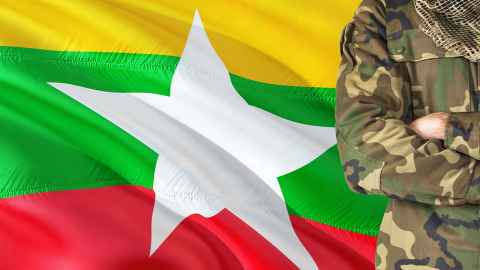Should Myanmar refugees be treated the same as those from Ukraine?
5 August 2022
Opinion: The execution of four pro-democracy activists in Myanmar is only the latest evidence of the brutality of the military regime, writes Liyun Wendy Choo.

On the morning of 1 February 2021, Myanmar citizens found themselves waking up to a nightmarish reality: an unexpected coup has returned the country to the hands of a brutal military regime.
More than one year on, the nightmare has yet to end. Myanmar’s military regime has executed four pro-democracy activists and refused to hand over the bodies to their families. The four activists were sentenced to death earlier this year in closed-door trials and came from different walks of life. What bounded them together was the fight to free themselves and their fellow Myanmar citizens from what Aung San Suu Kyi had called “a way of life disfigured by corruption and fear”.
The four pro-democracy activists are not alone in their fight. Many Myanmar citizens, including many state employees, have been involved in a civil disobedience movement since 2021. The whole point of the movement was to prevent the military regime from establishing a new order of life and thus deny it legitimacy. Within the education sector, many teachers, students, and young people boycotted public schools and universities.
New Zealand has taken a principled stance on Myanmar but more could be done.
Last year, my Myanmar co-author and I examined online news sites to understand the range of positions the junta and Myanmar citizens adopted to the re-opening of schools in June 2021.
We found that the pandemic has made the mundane routine of starting the new school year more onerous in many countries around the world, but in Myanmar, the re-opening of schools in June 2021 has taken on added political significance. Supporters of the civil disobedience movement saw school attendance as an act of consent and endorsement of a brutal military regime rather than citizens simply exercising their right to education.
This year, the brutality of the military regime, severe economic hardship and concerns about livelihood have made it extremely difficult to sustain the movement. Citizens participating in the movement do so at tremendous personal, social, and economic cost.
Additionally, Myanmar’s situation reminds us that all labels are acts of power. The Irrawaddy, a news website founded by Myanmar exiles living in Thailand, saw the pro-democracy activists as “heroes” and their deaths as a “black day for Myanmar”. While many Myanmar citizens saw the men executed as freedom fighters doing what they could to liberate the country from a hopeless and bleak future under a military dictatorship, the state press, Global New Light of Myanmar, claimed the four men were terrorists.
The junta claims that the executions were “justice for the people” and that the four pro-democracy activists had conspired to commit “brutal and inhuman terror acts”. Yet, in the last year, the junta has killed at least 1,500 people involved in protests against the coup, including children, with thousands more possibly killed in the armed conflict.
It is noteworthy that New Zealand has taken a principled stance on Myanmar. This stance has translated into travel bans on individuals linked to human rights violations in the state, refusal to engage with the military regime on the Regional Comprehensive Economic Partnership and careful review of existing aid programmes to Myanmar to ensure that projects are not delivered with, nor benefit the military.
However, more can be done to support the Myanmar people. Recently, a petition has been delivered to Parliament to allow one thousand refugees from Myanmar whose families are New Zealand citizens, permanent residents, quota refugees and asylum seekers, to be resettled in New Zealand within the category “emergency humanitarian rescue mission”.
The Government has provided strong humanitarian support for Ukrainian refugees and could extend the same concern and compassion to Myanmar refugees by supporting the petition.
Liyun Wendy Choo is a Professional Teaching Fellow at the Faculty of Education and Social Work at the University of Auckland. Her doctorate was on citizenship in Myanmar.
This article reflects the opinion of the author and not necessarily the views of the University of Auckland. First published in Newsroom on 31 July.
Media contact: Gilbert Wong, gilbert.wong@auckland.ac.nz